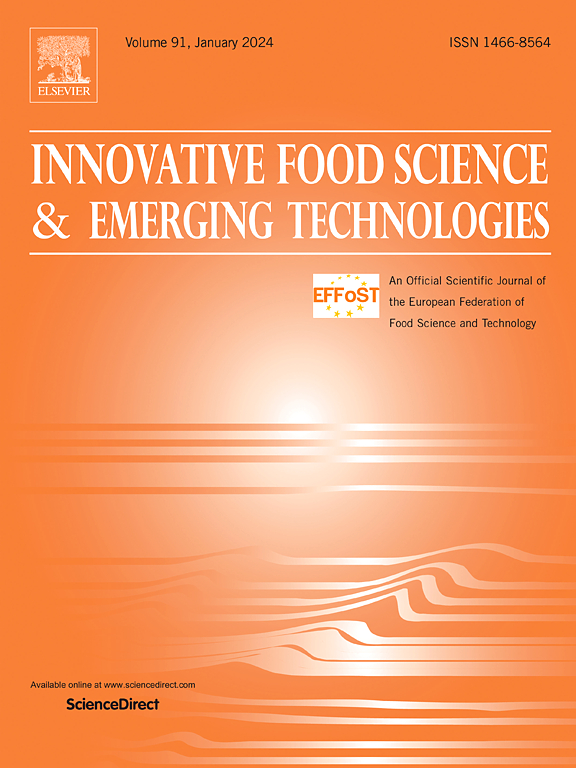Continuous cold plasma reactor for the processing of NFC apple juice: Effect on quality control and preservation stability
IF 6.3
1区 农林科学
Q1 FOOD SCIENCE & TECHNOLOGY
Innovative Food Science & Emerging Technologies
Pub Date : 2024-12-17
DOI:10.1016/j.ifset.2024.103905
引用次数: 0
Abstract
Cold plasma is an emerging non-thermal processing technique that effectively inactivates microorganisms while mitigating the degradation of food quality associated with thermal processing. To improve the performance of cold plasma in the quality control and preservation of liquid foods, a novel continuous reactor was established. We investigated the effect of reactor microbial control and quality preservation by processing Not from concentrate (NFC) apple juice. The Continuous Cold Plasma (CCP) reactor successfully reduced natural microorganisms in apple juice to levels below the detection limit, specifically achieving a 5-log reduction in Escherichia coli. The microbiological stability of CCP-treated samples is comparable to pasteurized (PT) samples. The CCP treatment did not significantly affect the physicochemical properties of the apple juice. Compared to PT, CCP treatment better preserves total phenolics, ascorbic acid, and antioxidant properties, especially ascorbic acid (only 4 % loss). When stored at 25 °C for 30 days, the CCP group exhibited a significantly lower color change (ΔE = 4.08) compared to the PT group (ΔE = 7.54). CCP treatment better preserved several polyphenols such as cianidanol, l-epicatechin and chlorogenic acid (only 24.9 %, 14.6 % and 1.3 % reduction respectively). In addition, CCP contributed to preserving the levels of characteristic volatiles such as isoamyl acetate, hexyl acetate and hexanal. Overall, CCP provides better inactivation of microorganisms in apple juice and maintains a more stable quality during storage.
求助全文
约1分钟内获得全文
求助全文
来源期刊
CiteScore
12.00
自引率
6.10%
发文量
259
审稿时长
25 days
期刊介绍:
Innovative Food Science and Emerging Technologies (IFSET) aims to provide the highest quality original contributions and few, mainly upon invitation, reviews on and highly innovative developments in food science and emerging food process technologies. The significance of the results either for the science community or for industrial R&D groups must be specified. Papers submitted must be of highest scientific quality and only those advancing current scientific knowledge and understanding or with technical relevance will be considered.

 求助内容:
求助内容: 应助结果提醒方式:
应助结果提醒方式:


